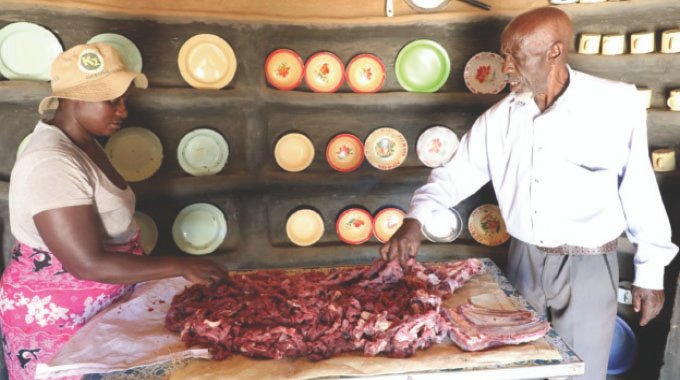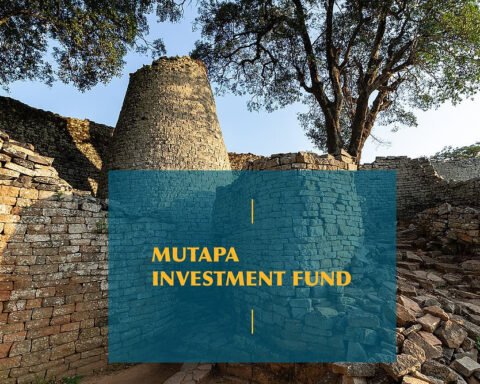January Disease, also known as Theileriosis, is a cattle ailment transmitted by ticks. Since the start of the year, farmers in Matabeleland South have lost a staggering 11,200 cattle. Desperate to salvage their dwindling assets, these farmers have forged an alliance with a group colloquially referred to as the ‘men who come in trucks’. These individuals purchase the diseased cattle at an agreed price, allegedly selling the meat to city butcheries.
The sight of strips of meat, hung on a string attached to two wooden poles for preservation as biltong, fills Khethiwe Sibanda with a sense of hopelessness. The meat comes from a beast her children slaughtered, not by choice, but out of desperation to salvage something from one of the family’s herd of cattle that succumbed to January disease. “This is my 18th cow that died yesterday morning due to January disease. As soon as I heard that it was struggling to walk and drink, I immediately knew it was January disease that had struck my kraal again and I told my children to prepare to slaughter it. Of course, I reminded them to remove the offals and throw them away after slaughtering it,” said Sibanda.
Sibanda, a farmer in Emalungwana village, located in Esigodini, Matabeleland South, finds herself grappling with January Disease. Her recently deceased beast is one of the many casualties among the 11,200 cattle that have succumbed to this ailment in Matabeleland South since the year began.
In an effort to monetize their vanishing wealth, farmers now sell their diseased carcasses to individuals from Bulawayo, who are suspected of further distributing the tainted meat to local butcheries. Sibanda initially dismissed rumors about the cattle-buying men in trucks, assuming her own herd remained unaffected. However, tragedy struck her home when she lost her first cattle to this insidious disease.
“When the first one died I instructed my children to slaughter it and we made biltong out of it,” said Sibanda.
“However, when another one died after two days and two more started showing signs of having the disease I knew I was in trouble and went to my neighbor who told me the men came every day around 6 PM and the sale took place near the dipping tank,” she said.
Another farmer, Khulumoni Mhlanga, expressed that they lacked knowledge about the men’s identities and origins. However, based on conversations with these men in a truck, they inferred that the men might be coming from Bulawayo and were supplying meat to various butcheries in the city. Mhlanga highlighted that villagers faced financial challenges regarding cattle. Specifically, for the slaughtered cattle, they received only US$150, while those showing signs of disease fetched US$200. The economic struggle was particularly pronounced for the deceased animals that had been slaughtered.
“We are doing this because we have no other choice and it’s the only way of getting something out of our herds otherwise we might lose all our cattle and be left with nothing to show we were once cattle farmers,” said Mhlanga.
January disease, prevalent during the traditional rainy season, affects cattle. Recognizable symptoms include self-isolation, teary eyes, swollen glands, flu-like signs, and weakness that hinders their ability to keep up with other animals.
Prevention strategies involve regular cattle dipping and vaccination against the disease. Additionally, close monitoring of animal movements helps avoid areas where the disease peaks. Dr Gwinyai Zhandire, a local veterinary doctor, said January disease does not directly impact humans. However, consuming meat from a cow that succumbed to this ailment poses significant risks. Farmers remain unaware of other opportunistic diseases the cattle may have attracted before their demise.
“When a cow gets January disease it becomes weak and it’s easy for other opportunistic diseases like anthrax, pneumonia and so on to affect them. These are the most dangerous diseases because some of them remain in the cow even after it has died and when farmers sell that meat to people and they eat they stand a chance of falling sick.
“Apart from the opportunistic diseases there is also an issue of vaccines and medicines that are given to the animal before it dies. There are some substances of those medicines that will be still in the blood and may be very dangerous for human beings. ”
Dr Zhandire said that due to these effects, a cow that succumbs to January disease or any other ailment must be either burned or buried. Additionally, there exist legal provisions such as the Statutory Law of 1995 and the Public Health Act that forbid farmers from selling diseased meat and require all meat to undergo testing at the abattoir before sale. “It’s unfortunate that farmers will be trying to recover some money which we totally understand yet they are putting their lives and those who will eat the meat they are selling in danger,” said Dr Zhandire
He advised farmers to consider selling their cattle during disease outbreaks. By doing so, they could capitalize on good prices, provided they follow proper selling practices.
William Dube, a Bulawayo resident, expressed suspicion about the inexpensively priced meat from small butcheries. Residents suspect that some of this meat might be the same diseased meat discussed by farmers.
“Some of the meat we get from these butcheries will be tasteless and its quick to go bad, when we first heard about January disease and how close it is to us, the prices we are getting at these butcheries became suspicious. “Police should conduct 24 hours operations whereby they will be stopping any truck on the road checking to see if those trucks are not carrying any unauthorised meat and cattle.
“This operation should not only stop with the trucks on the road but farmers should be educated on the dangers of selling diseased meat and proper ways of dealing with such meat,” said Dube.
“According to a local healer, Khulu Ngwenya, when a cow dies from diseases, there are traditional guidelines to follow if a family must consume its meat. The crucial aspect is that the meat should not be boiled; instead, it should be fried over an open fire, as this is believed to neutralize any lingering disease.
“The head of the house is the one who does the preparation of the meat. He has to cut apiece from the cow that has died, a piece that he knows they will be able to finish as a family. The rest of the dead animal has to be thrown away. “The head of the of the house then has to prepare the meat in-front of the home’s kitchen.








